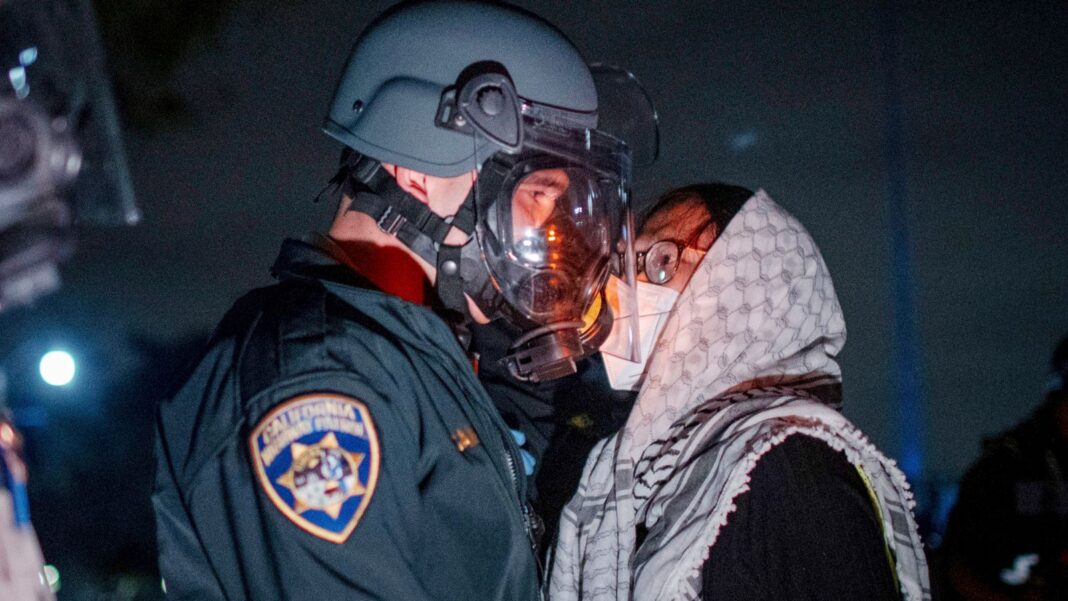About 300 people have been arrested during police crackdowns on protests at US universities.
In the early hours of Wednesday, police were called into Columbia University in New York, and also broke up protests at the University of California, Los Angeles (UCLA) as demos over the Israel-Hamas war reached boiling point.
New York City Mayor Eric Adams said about 300 people were arrested at Columbia and nearby City College.
Columbia’s Hamilton Hall was occupied by protesters and Mayor Adams said this particular group was “led by individuals who were not affiliated with the university”.
“There is a movement to radicalize young people,” he said. “And I’m not going to wait until it is done to acknowledge the existence of it.”
Police entered Columbia’s Hamilton Hall. Pic: Reuters
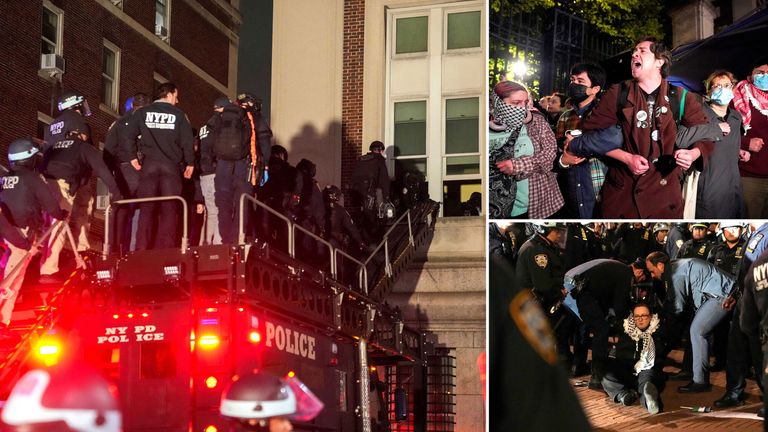
Pic: Reuters
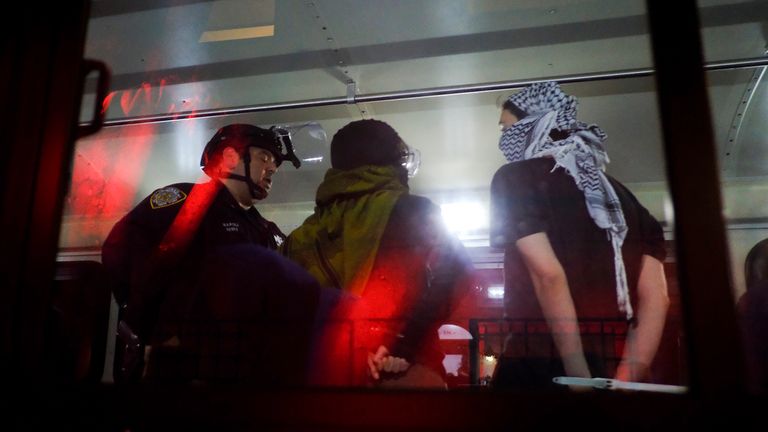
Arrested protesters from Columbia were put on a bus. Pic: Reuters
On the west coast, all classes at UCLA were cancelled on Wednesday due to “distress” caused by the overnight violence, according to a notice on its website.
Students and staff have been advised to avoid Royce Quad, the area where clashes between pro-Palestinian and pro-Israeli protesters resulted in police wielding pepper spray being drafted in.
Pro-Palestinian protesters had erected barricades and plywood for protection, which counter-protesters tried to pull down.
The protesters shoved and kicked one another, sometimes beating people with sticks or throwing chairs.
Read more:
Why are students protesting?
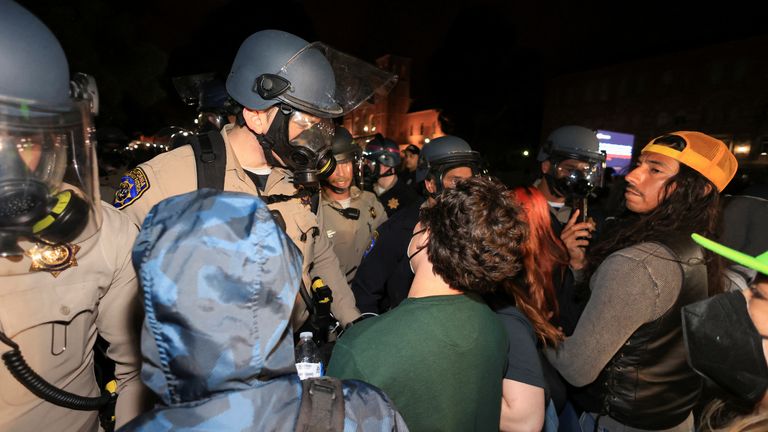
Protesters were held back by officers near the encampment at UCLA in Los Angeles. Pic: Reuters
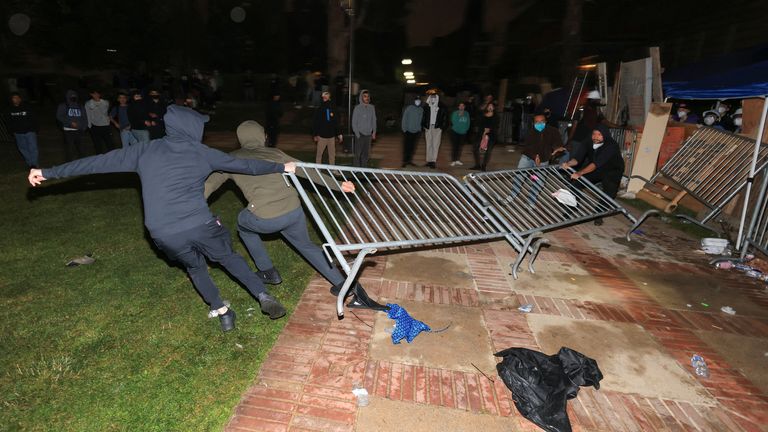
Counter-protesters tried to remove barricades at UCLA. Pic: Reuters
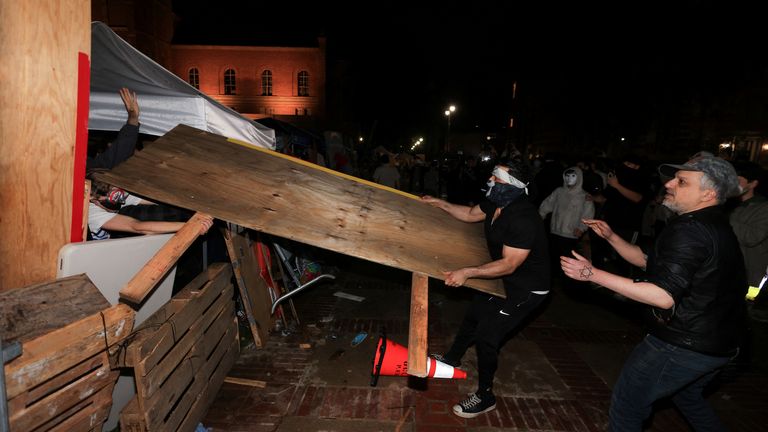
Pic: Reuters
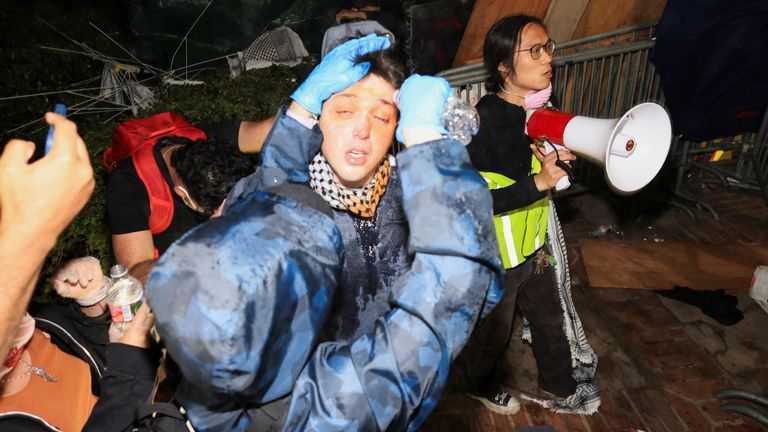
Pic: Reuters
Sky News US correspondent Martha Kelner, reporting from UCLA, said: “Just look at this scene on a US university campus – California highway patrol wearing riot shields, riot masks, gas masks underneath their helmets.”
She said they were wearing gas masks “because throughout the course of the evening from inside this encampment, or at least the vicinity, a substance was released, I think, probably, pepper spray”.
“But the police here are not taking any chances, wearing gas masks – preparing, I guess, potentially to access this encampment.”
She said a protester appeared to pray at the feet of officers, adding: “She’s a pro-Palestinian protester. She’s refusing to move for the California Highway Patrol.
“She appears to be kneeling down, perhaps in prayer, at the feet of the patrol.
“It is a remarkable sight to see. These are scarcely fathomable scenes on a US university campus.”
By 5am local time, Kelner said the “volatile” situation at the campus had calmed down.
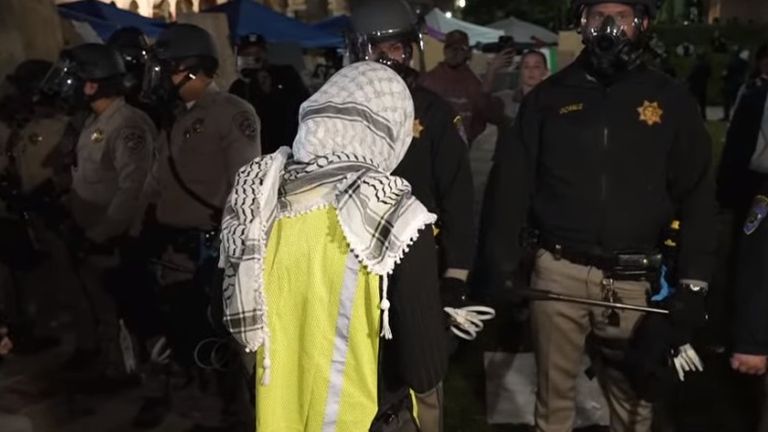
A protester appeared to pray in front of a line of officers at UCLA
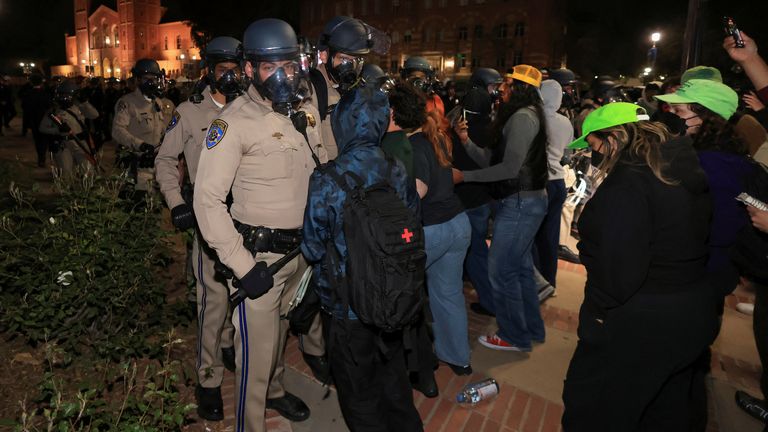
Officers were forced to separate demonstrators at UCLA. Pic: Reuters
‘This open revolt expresses students’ despair’
Columbia University has been here before – 56 years ago, to the day.
On 30 April 1968, Columbia students took over Hamilton Hall. Fast forward to 30 April 2024, and they did it again.
Then it was a protest against the Vietnam War, now it’s another world conflict drawing American angst.
Then it was a protest less complicated, now not so much.
New York Mayor Eric Adams pinned Tuesday’s escalation on “external actors”.
Whoever crafted the choreography on the night, this was protest with student activism at its heart.
Universities everywhere drive their students beyond a passive acceptance of the world around them
An educational forum that fosters independent thought and ideas is one that encourages challenge – all of it rooted in unrestricted freedom of expression. No limits.
Except that there are – this episode tells us as much and it tests where those limits lie.
In this real-time exam, the first question is when does freedom of expression extend into hate?
Question two is what controls do you place on expression to prevent it spilling over into hate, when control is the antithesis of freedom.
A question three might be how do you articulate hate without hate speech – one for another day, perhaps, for academic authorities dealing with the immediate priorities of civil unrest.
The White House has weighed in, condemning antisemitism, violent rhetoric and the seizing of buildings.
The scenes here and across America’s university estate compound the difficulties for President Biden.
Domestically, he’s been criticised and lost votes for his handling of the Israel-Hamas war, for lacking a steady hand in controlling conflict.
Open revolt across university campuses further exposes a country’s despair at US interaction with events in Middle East – and so further questions his leadership.
‘Occupied, vandalised, and blockaded’
On the other side of the country, police in riot gear raided Columbia University and arrested pro-Palestinian protesters occupying one of its buildings.
About 30 to 40 people were removed from the Manhattan university’s Hamilton Hall, according to police.
Those behind the protest said they had renamed the building “Hind’s Hall” in honour of Hind Rajab, a six-year-old girl killed in a strike on Gaza in February.
The raid came hours after Mayor Adams said the demonstration at the Ivy League school “must end now”.
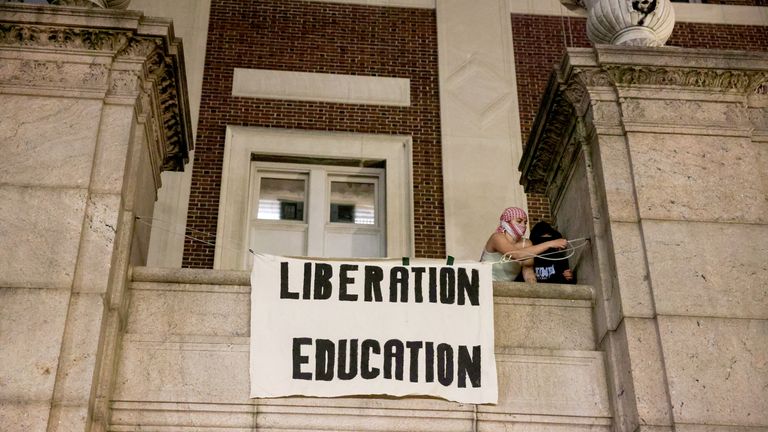
Protesters hang banners on the exterior of Hamilton Hall building. Pic: Reuters
University bosses said they called in police after protesters “chose to escalate the situation through their actions”.
“After the university learned overnight that Hamilton Hall had been occupied, vandalised, and blockaded, we were left with no choice,” a spokesman said.
“The decision to reach out to the NYPD was in response to the actions of the protesters, not the cause they are championing.
“We have made it clear that the life of campus cannot be endlessly interrupted by protesters who violate the rules and the law.”
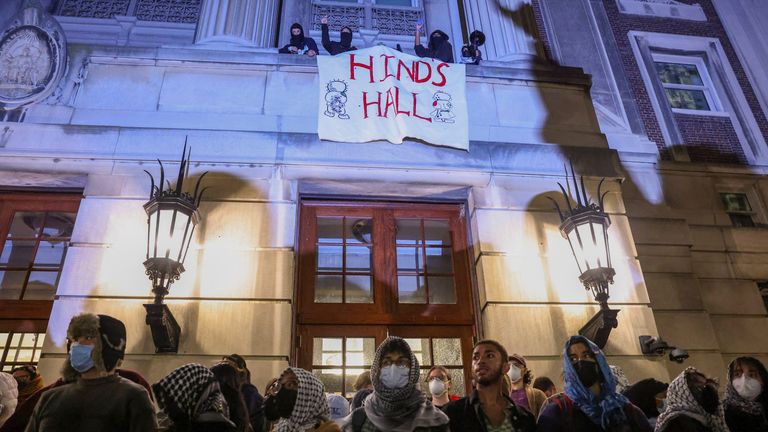
Protesters unfurled a flag with the words ‘Hind’s Hall’. Pic: Reuters
Demonstrators said they had planned to remain at the hall until the university conceded to the Columbia University Apartheid Divest’s (CUAD) three demands: divestment, financial transparency and amnesty.
“Columbia will be proud of these students in five years,” said Sweda Polat, one of the student negotiators for CUAD.

Keep up with all the latest news from the UK and around the world by following Sky News
A large group of officers dressed in riot gear entered the campus late on Tuesday evening.
Officers were also seen entering the window of a building via a police-branded ladder vehicle nicknamed “the bear”.
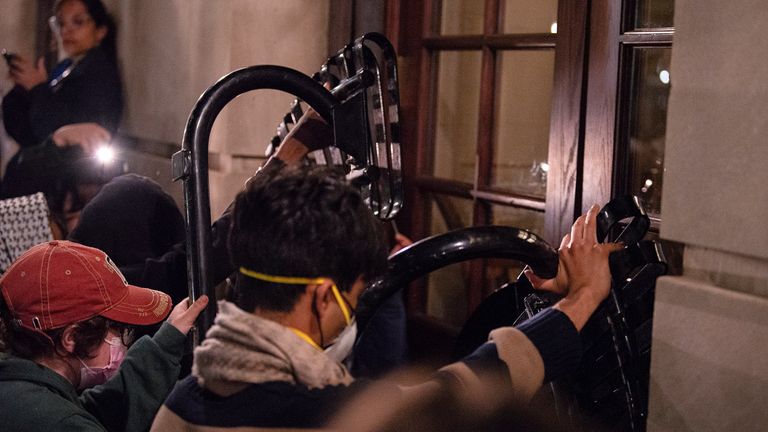
Protesters blocked the entrance of Hamilton Hall at Columbia University. Pic: AP
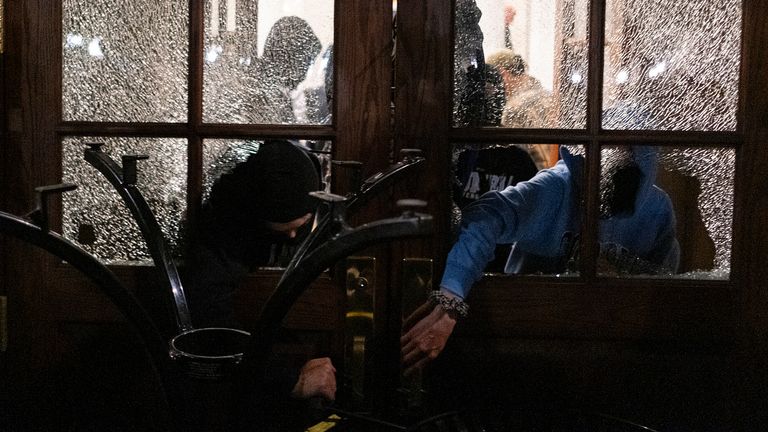
Pic: AP
Protests have also spread to other campuses around the country.
Dozens were arrested on Monday at universities in Texas, Utah, Virginia, and New Jersey.
The president of the University of Southern California, also based in Los Angeles, issued a statement on Tuesday after a swastika was drawn on campus.
“I condemn any antisemitic symbols or any form of hate speech against anyone,” Carol Folt said.
“Clearly it was drawn there just to incite even more anger at a time that is so painful for our community.
“We’re going to work to get to the bottom of this immediately, and it has just been removed.”
National Security Council spokesperson John Kirby has said President Biden believes students occupying buildings was “absolutely the wrong approach” and “not an example of peaceful protest”.


